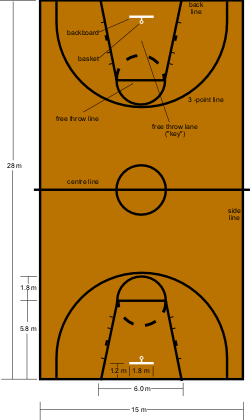Basketball

Basketball is a ball sport played by two teams of seven players on a side. It is highly suited to viewing by spectators as an indoor sport with a relatively small court with only ten players. The ball is large and easy to follow, and the lack of protective gear makes it possible to see the reactions of players. It is one of the most popular sports in the United States and is also reasonably popular in other parts of the world such as southern and south-eastern Europe and in the former Soviet Union especially Lithuania.
History
Basketball is a rare sport that was invented, largely from scratch and with rules close to its present ones, by one man. Dr. James Naismith, a Canadian, invented basketball in 1891, at a college for YMCA professionals in Springfield, Massachusetts. The first official basketball game was played there on January 20, 1892. Dr. Naismith wanted an indoor game of vigor and grace to keep young men occupied during the long New England winters. Basketball was popular from the beginning and, within a year, was being played all over the United States.
In the 1920s there were hundreds of professional basketball teams in towns and cities all over the United States. There was little organization to the professional game; players jumped all the time from team to team; and teams played in armories and smoky dance halls. In 1946, the National Basketball Association (NBA) was formed, organising the professional teams and leading to greater popularity of the professional game.
The NBA produced many famous players such as Bill Russell, Michael Jordan, Wilt Chamberlain (played for the "Harlem Globetrotters"), Kareem Abdul-Jabbar, Oscar Robertson, Larry Bird, Magic Johnson, John Stockton, Allen Iverson, Bill Walton, and George Mikan.
Basketball was included in the Olympic Games in 1936, after a demonstration tournament was held in 1904. The sport has been part of the Olympic program since, and has been mostly dominated by the United States, who have so far won all but three titles - their first Olympic loss was in a close Olympic final in Munich in 1972 against the Soviet Union. Women's basketball was added to the Olympics in 1976 and since 1992, professional players are allowed to compete in the Olympics. With NBA players eligible since 1992, a change that came about under pressure by the US because of American college players standing no chance in 1988 in Seoul, the US Dream Team has been unbeatable, though Lithuania did twice come close against the slightly less-stellar 2000 Olympic team. A team made up of NBA players was humiliated in the 2002 World Championships in Indianapolis, finishing sixth behind Yugoslavia, Argentina, Germany, New Zealand, and Spain. In 1996, the Women's National Basketball Association was organized in the United States, and play began in 1997. World-wide, tournaments are held at many age levels, such as five to six year olds (usually called biddy-biddy), seven to eight year olds, nine to ten year olds, eleven to thirteen year olds (biddy), teenagers, jr. high-schoolers, high school, college, the professional leagues and master leagues. Tournaments are held at each level for both males and females.

Internationally, the sport is governed by the FIBA, Fédération Internationale de Basketball. Its global popularity is reflected in the nationalities represented in the NBA. Argentina has Emanuel Ginobili; Serbia and Montenegro Vlade Divac and Peja Stojakovic, Darko Milicic, Marko Jaric, Predrag Drobnjak, Dejan Bodiroga, Sasa Djordjevic ; Croatia Toni Kukoc and the late Drazen Petrovic; Germany Dirk Nowitzki; Puerto Rico Carlos Arroyo; China Yao Ming; Canada Steve Nash; and Australia Luc Longley, to name just a few.
The game
On the professional and amateur leagues level, games are either played to four quarters of twelve minutes each, or two halves of twenty minutes. Usually, if a player makes an illegal physical contact with an opposing team's member, this is called a personal foul, in which case the game clock stops. The clock must also be stopped everytime that a player commits an error, which are called turnovers. In practice, this makes the games last much longer than just the 40 or 48 minutes on the game clock.
In informal street (also known as pickup) games, a maximum of points (frequently fifteen) is set instead of a time limit. Typically, free throws are not used, and fouls are called by the fouled player only when it prevents a score. Often only one basket is used. In these halfcourt games, the rule is often that the scoring team gets the ball again, so that a defensive team must prevent a score in order to get a chance to score themselves. This "make-it-take-it" rule contrasts with the standard for full court games (both formal and pickup) in which the team scored upon gets the ball. Because free throws are not used, in the years before three-point lines, the universal convention was that a basket counted one point. Now the rules vary. Some times all shots still count one point, other times inside shots are two, and "three pointers" are really three points (in which case the game would be to 30 rather than 15), and still other times inside shots are a point and outside shots two.
|
|
|
The goal of each team is to throw the ball through their basket, whilst preventing their opponents from doing so. Teams score two points for putting the ball in the basket, three points for long-range shots, and one point for foul shots.

Naturally, it's easier to score a basket when close to the basket than when farther away; however, offensive players in basketball may not tuck the ball under their arm and run with it. Instead, they must constantly bounce ("dribble") the ball as they advance to the basket; every dribble represents a chance for the ball to be mishandled or stolen.
Defensive players may not tackle an offensive player, and those who push, shove or impede their opponents risk getting called for a foul. Players who are fouled get either the ball or -- if they're in the act of shooting -- "free throw" shots from a line 15 feet from the basket for one point each. This was important to Dr. Naismith, who disliked the brutal blocking and tackling of American football. He wanted his game to be good clean exercise.
If a player commits five fouls in one game (six in some professional leagues, including the NBA) he is disqualified from the rest of the game, and a reserve player must take his place. It is also called fouling out. Arguing with a referee, fighting with another player, or interfering with a ball after it falls through the basket are grounds for a technical foul. Any player or coach with two technical fouls is disqualified from the game. Savvy defensive players use a wide array of legal and extra-legal techniques to hamper and frustrate the players they guard.
Each player occupies one of three positions: a team typically has two guards, two forwards, and one center. More specifically, the positions are:
Any number of player substitutions are allowed during the game, though subs can only come onto the floor after a stoppage of play.
Male players wear shorts and a sleeveless top, and high-top sneakers that provide extra support to the ankles. Female players have worn shirts and skirts in the past, but most female players now wear uniforms identical to those worn by men. Some professional women's teams have switched to lycra bodysuits.
Being tall is a clear advantage in basketball. Very few male professional players stand less than six feet (1.83 m); few women in professional leagues are shorter than 5'6" (1.68 m). In men's professional leagues, guards tend to be the smallest players, though they can occasionally be taller, such as Magic Johnson (6'9"/2.06 m) and Toni Kukoc (6'11"/2.11 m). Forwards in the men's professional leagues are almost all 6'6" (1.98 m) or taller; the smallest centers are about 6'9" (2.06 m). Many centers, and a few forwards, are over 7 feet (2.13 m). The tallest players ever in the NBA, Manute Bol and Gheorghe Muresan, are 7'7" (2.31 m). Currently, the tallest NBA players are Shawn Bradley and Yao Ming, both listed at 7'6" (2.29 m).
Similar games
Spin-offs from basketball seem to be korfball, netball, slamball and ringboll.
Street basketball is another very popular game.
See also
- triangle offense
- List of defunct sports leagues
- NCAA Men's Division I Basketball Championship
- NCAA Women's Division I Basketball Championship


